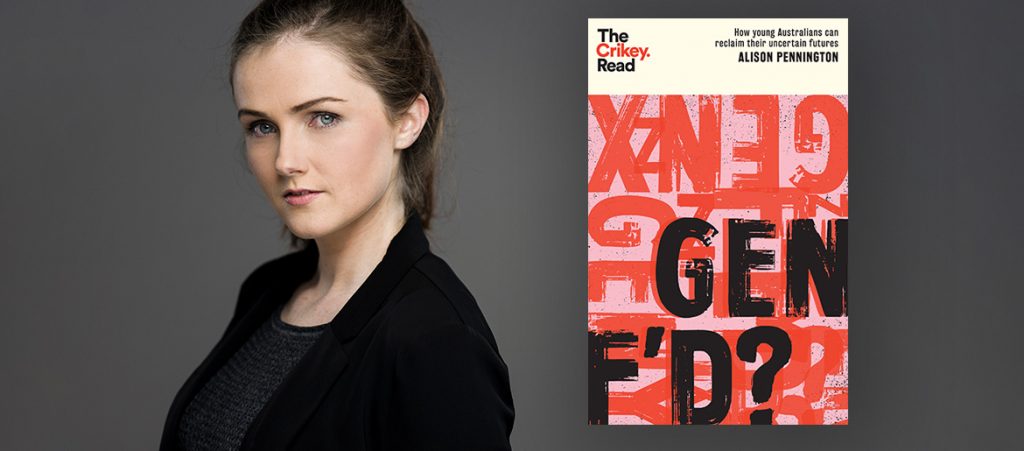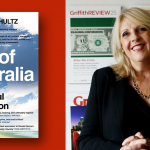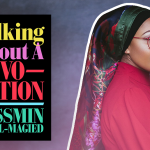Things I don’t have to tell you: shit’s tough in Australia right now. It is significantly more difficult for young people to hit any milestones of adulthood, and Gen Z is on track for the proud honour of being the first generation poorer their parents. Fun! But how did we actually get here, and how can we even begin to change the circumstances we’re in?
Economist and writer Alison Pennington has the answers in her powerful little book, Generation F’d: How Young Australians Can Reclaim Their Uncertain Futures. Pennington does not pull a single punch, explaining how the neoliberal myth (that the private markets provides the best solutions for everything) has backed young Aussies into an economic corner – I read the entire thing in one night, and have never felt so seen.
So, where to from here? I spoke to Pennington about why young people need to start getting noisy, offline, about the changes in thinking and decision-making necessary for our survival.

Zee Feed: Gen F’d does a great job of showing that neoliberalism, rather than just plain old capitalism, is what’s causing young people’s lives to be much worse than previous generations. What example stood out the most to you?
Alison: The experience of work stood out to me, because it was so fundamental to my survival. I describe coming from a poorer working class family and even though my parents struggled, my experience of work was worse than what they had. I did everything I was supposed to do to mobilize. I was the first to go to university in my family. I was working my ass off, just like my parents told me to, I got the education and I had a string of 14 or 15 insecure jobs in a row. I was never told ‘work will be the most amazing, profound thing you do in your life,’ but once you got a job it was [supposed to be] one you knew was gonna be paying income every week. You weren’t supposed to get to the end of a week fearing whether you’d have a shift next week.
And I know this isn’t just my experience, a lot of other people are in that position. It’s incredibly damaging, particularly to young Australians because they internalize a system that is designed to fail them as their own individual failures.
Gen Z and Millennials have been so affected by the last 10 years of government, there is a tendency to treat these as issues created by Coalition or conservative governments. Are the barriers we’re now facing partisan, or is it more broad-based?
The settings that have dismantled the ‘fair go’ for young and poor Australians are the product of bipartisan policies over several decades. Since the late 70s and 80s there were increasing policies of privatization, deregulation, reducing taxation, dismantling collective power in unions… The sum effect of those policies has been to reduce the responsibility of government in providing for people’s living standards and providing opportunity. We didn’t get here because it was one side of politics. It’s a product of decades of political decisions, and the decades of the reproduction of a logic.
Why do you think that neoliberal way of thinking – the ‘logic’ – is so alluring to people, even now we can literally see that it does not work?
It’s empowering to think that there’s a way that you can buy yourself out of your position or work hard enough out of your position. Like a formula. If I just tick the boxes, then I’ll get there. In the book I make a parallel with the depression and the post-war period… I think neoliberalism has returned us to the deprivation and trickle down economics that led to the depression. If you look at what was said in that time it was the same thing: ‘If you work hard enough, by your bootstraps you’ll be up again.’ ‘We have to give full power to individual private interests in the economy, it’ll eventually be in the interest of everyone.’ It’s exactly the same narrative that led us to that 1930s moment.
The lie underpinning all of this is that you can do it by yourself. That’s not possible, we have to do it through collective action and working together.
Clearly keeping that mindset in the mainstream benefits powerful people. But is it a deliberate plan by those people to keep the neoliberal myth alive, or is this just what happens when there is lots of short-term, greedy decision making?
It’s very common when we look at the levers of government, public administrations, big capital power, to assume, ‘okay, there must be a plan behind them.’ My thinking on this has changed over time. When you actually see decision making in place and the millions of people who are involved, you see that sometimes power is reproducing itself purely because there’s no intervention into it.
It’s not one bad guy at the top. We want the boogeyman and we want someone to go for. What’s much harder is to think about the logic by which we are organizing our economic and social policies, and how that is filtering down into people’s lives and how politicians are making decisions based on that logic of ‘the market’s always right, private sector is always right.’ Dismantling that is as much about what’s inside our minds and our hearts, as it is finding the big guy at the top and trying to drag him down.
Right, like there is no point in getting more young people or women into politics or corporations, if just we go into these spaces and make exactly the same kinds of decisions. That won’t make a difference.
Yeah, one thing that has stood out to me as a complete, abject failure is the whole brand of youth politics. It feels naff – and it is naff! The people who are the chosen voices may be more representative of young people, but they are curtailed. Their contributions are only ever about young people’s feelings – you can talk about climate change, you can talk about mental health and maybe bad jobs, but you can’t articulate what’s wrong with the nation, what’s wrong with power. You can’t be a serious equal in the discussion.
It’s a convenient way to kind of keep them in this one space and not let any kind of different rhetoric into where the majority of decisions are actually happening.
Challenges from housing shortages to insecure work are pushing many young Australians to feel long-term security is unattainable. And economist @ak_pennington warns change is needed
— Swati Pandey (@Swatisays) March 14, 2023
Read the full story here: https://t.co/uBNMJFN7Hm@maheath1 @BloombergAU
Okay so, what do we do? How can we course correct all this?
It’s a short book! But I wanted to provide ideas about how young people can start to think more strategically about intervening into power. For starters, it’s everywhere and anywhere. It starts in community, it’s gotta be political representation, it’s gotta be multi-strategic, multi-tactic.
But in order to win all people to our side we have to be able to have articulate positions on the things that determine people’s lives, like jobs and housing and whether they can access healthcare that they need. These are the systems that shape our lives. And inside each of those systems are different power dynamics, different power brokers, different logics. So while I think it’s important to have that higher level understanding of, you know, moral right and wrong, we also strategically need to get inside institutions and think about how to shift the logic inside of them.
All the different ways that young people have been told to individualize their pain has kept a lid on all of this. But we have to acknowledge what’s putting the lids on and really take ’em off and get crazy, get talking, get organizing.
But not online, right? In Gen F’d you have this great metaphor of the Internet as a ‘shorthanded ho’ that actually stops us from having the energy and clarity to make the changes we need…
There is wide ranging research showing that we are losing our capacity to focus, social connectedness is declining. I’m of the generation where my brain wasn’t socialized in the internet technology space – I remember going to computer class in school and doing KidPix! And what has given me strength in my life to articulate problems, to analyze them and to be brave and strong enough to reach across and build solidarity with people I don’t know, is because of that cultivated social world that I’ve lived in. None of that was done through the internet – what makes me feel love and solidarity for people I don’t know, which is essentially what we need in order to change the world, isn’t because I met someone on the internet, it’s because I saw them in real life. I looked them in the eye, we had a conversation, we fought together side by side. We achieved outcomes together side by side.
I want that for young Australians, I want us all to be able to feel that. The internet is there to connect up power once we’ve built it, but it cannot do the work for us. I didn’t want to be the old woman writing this! But I’m increasingly of the position that it is a hindrance until we properly regulate these big tech platforms that keep our attention, keep us in a fog, keep us in this busy state of extracting data from us as a product.
How do we get older generations to understand all this and join us in changing it?
I think older people think young people have it good because we’ve got access to new consumer goods. We’ve seen amazing progress in digital technologies, access to cheap cooked meals and all these things that come with cosmopolitan capitalism they never had in their time. So they look at us and say, ‘You’ve got it so good!’ But the substance of life – like a decent job and a secure roof over your head – these are the things that are being ripped out from underneath us.
I would say Australians, including older generations, generally have a social democratic impulse. They believe government has a responsibility to provide good living standards for all. And it’s important to remember they also fought to make their lives better thinking that it would be setting their kids up as well. It’s a matter of reaching out to those people and speaking in the language that they understand – that’s what organization is about. It’s not gonna be a few op-eds in the Guardian that changes their mind. It’s gonna be millions of people mobilizing on the streets, organizing in all aspects of their lives in the workplace, in their communities, and meeting each other and talking across divides that help us to understand our problems.
The media has certainly fed that generational warfare…
It’s not helpful. This is exactly what our detractors want us to do – to be divided and focused on looking at the current pie and fighting over who gets what. That pie has been getting smaller and smaller for decades under neoliberalism, and our goal is to expand the pie and share it better. I think we’ll find lots of people on our side in that shared goal.
It’s about avoiding the intergenerational warfare, and finding people who are older but aren’t rich to work with us, because we have shared interest in doing so. I really wanted to center Gen F’d in a discussion of intergenerational equality, because it also points us to the solutions of how we’re gonna work together across generations, in our shared interests to build another Australia. No one single generation can do it. Throughout history there’s been youth-specific movements, but they only ever reach true power when they reach across the divide and work with people of all generations.




Comments are closed.